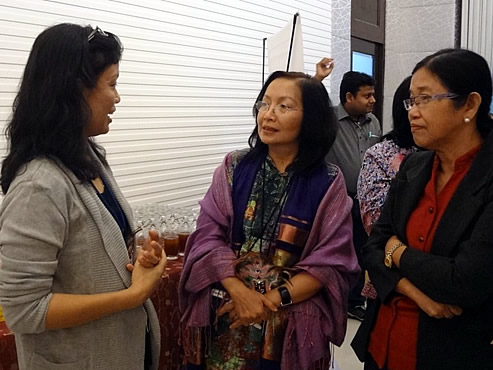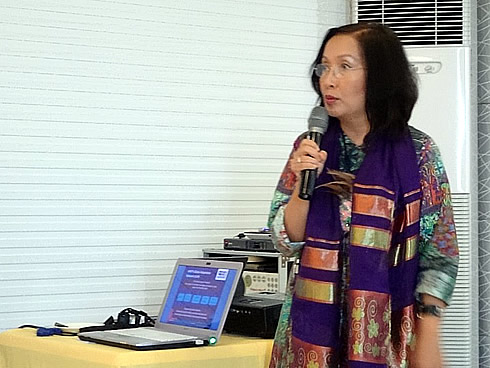 Inviting Dr. Maria Celeste H. Cadiz, Program Head of the Knowledge Management Department, to present on the work of SEARCA, specifically in terms of enhancing climate resilience in the field of agriculture and how potential partners can possibly link up and access the wealth of knowledge and services SEARCA can offer, Christian Aid focal persons requested SEARCA’s help in matching research needs in agricultural communities with researchers, graduate students, and academic institutions that can pursue such studies. In addition, Dr. Cadiz said SEARCA will henceforth circulate relevant SEARCA training announcements to Christian Aid, specifically those that could help strengthen the scientific base of their work on the ground.
Inviting Dr. Maria Celeste H. Cadiz, Program Head of the Knowledge Management Department, to present on the work of SEARCA, specifically in terms of enhancing climate resilience in the field of agriculture and how potential partners can possibly link up and access the wealth of knowledge and services SEARCA can offer, Christian Aid focal persons requested SEARCA’s help in matching research needs in agricultural communities with researchers, graduate students, and academic institutions that can pursue such studies. In addition, Dr. Cadiz said SEARCA will henceforth circulate relevant SEARCA training announcements to Christian Aid, specifically those that could help strengthen the scientific base of their work on the ground.
Christian Aid is an agency of Christian churches in Britain and Ireland mandated to work on relief, development, and advocacy for poverty eradication. Its work is founded on Christian faith, inspired by hope, and acts to change an unjust world through charity. It provides urgent, practical, and effective assistance where need is great, tackling the effects of poverty as well as its root causes.
In the learning and development meeting on 10 February, Dr. Cadiz presented SEARCA’s role as a thematic node for agriculture of the Asia-Pacific Adaptation Network supported by the Institute for Global Environmental Strategies (IGES) in Japan, along with a number of international organizations like the United Nations Environment Program (UNEP) and the Asian Development Bank (ADB). She expounded on SEARCA’s institutional mandate on capacity development through graduate scholarship, research and development, and knowledge management (KM), zeroing in on learning and KM initiatives advancing climate resilience. Her presentation also expounded on SEARCA’s Knowledge Center for Climate Change Adaptation in Natural Resource Management and Agriculture in Southeast Asia, dubbed as KC3, found at www.climatechange.searca.org.
Aside from SEARCA, presentations were also made by the ICLEI-Local Governments for Sustainability Southeast Asia and the Regional Integrated Multi-hazard Early Warning System for Africa and Asia (RIMES). ICLEI is a global association of cities and local governments dedicated to sustainable development involving 12 mega-cities, 100 super-cities and urban regions, 450 large cities, as well as 450 small and medium-sized cities and towns in 84 countries. Its Southeast Asian Secretariat serves as APAN’s sub-regional node for this region. Meanwhile, RIMES is an international and intergovernmental institution, owned and managed by 12 member states, for the generation and application of early warning information. RIMES evolved in the aftermath of the 2004 Indian Ocean tsunami from the efforts of countries in Africa and Asia , to establish a regional early warning system within a multi-hazard framework for the generation and communication of early warning information, capacity building for preparedness, and response to trans-boundary hazards. Among its member states are the three SEAMEO member countries of Cambodia, Lao PDR, and Timor Leste.
 At the meeting, Dr. Gemma Teresa T. Narisma, Head of the Regional Climate Systems Research Program of the Manila Observatory, gave an overview of the climate scenario and risks in Asia.
At the meeting, Dr. Gemma Teresa T. Narisma, Head of the Regional Climate Systems Research Program of the Manila Observatory, gave an overview of the climate scenario and risks in Asia.
Participants included 20–25 Christian Aid staff and partners from Bangladesh, Cambodia, Lao PDR, Myanmar, the Philippines, regional offices in South Asia and the Middle East, and the central office in UK.
The Christian Aid meeting in Iloilo included a trip to Guimaras Island and continued until 12 February. It aimed to (1) link Christian Aid programs to intergovernmental institutions to share learning and resources for resilience, climate justice, and disaster risk reduction; and (2) explore opportunities and plan for advocacy for climate justice, resilience, and disaster risk reduction. Ms. Rosario B. Bantayan, Program Specialist at SEARCA’s KMD Training Unit, also attended and networked with participants along with Dr. Cadiz on the first day of the three-day meeting. (Maria Celeste H. Cadiz)